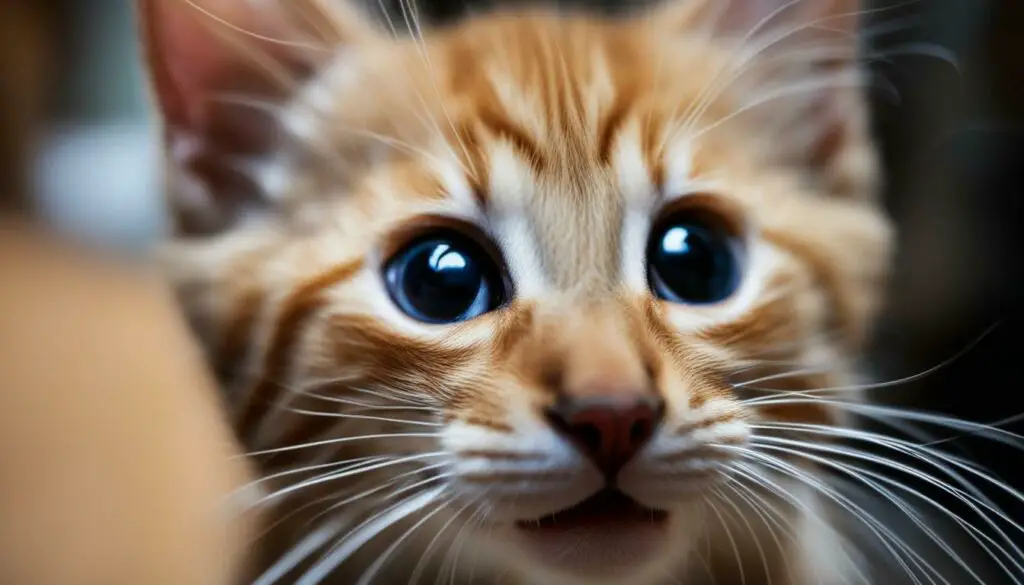If you’ve been wondering why your adorable little furball won’t stop meowing, you’re not alone. Excessive meowing in kittens can be puzzling and concerning, but fear not, as we delve into the reasons behind their constant chatter and how to effectively address it.
Factual data: Kittens meow a lot because they are still developing their communication skills. However, excessive meowing in kittens can be a sign of distress or illness. Common reasons for excessive meowing in cats include pain, urinary issues, kidney disease, hyperthyroidism, cognitive dysfunction, deafness or loss of hearing or sight, hunger, boredom, stress, breed traits, mating habits, and the need for attention or play. Cats may also meow at night out of boredom or because they want something, and health issues such as hypertension, overactive thyroid, or cognitive dysfunction may also contribute to excessive meowing at night. Male cats may yowl when they are looking for a mate, while female cats may yowl to signal their availability. To address a cat’s excessive meowing, it is important to identify the cause and ensure their basic needs are met. Avoid rewarding attention-seeking meowing, be patient, and wait for moments of silence before providing attention. It is crucial not to scold or hit a cat for meowing, as this can cause fear and damage the lines of communication. In cases of a change in meow tone or frequency or accompanying signs like poor appetite or weight loss, it is recommended to consult a veterinarian.
Key Takeaways:
- Excessive meowing in kittens can be a sign of distress or illness.
- Possible reasons for excessive meowing include pain, health issues, hunger, boredom, stress, and mating habits.
- Understanding the underlying cause is important to address excessive meowing effectively.
- Avoid rewarding attention-seeking meowing and be patient for moments of silence before providing attention.
- Consult a veterinarian if there are changes in meow tone or frequency or accompanying signs of concern.
Reasons for Excessive Meowing in Kittens
There are several factors that contribute to a kitten’s excessive meowing, and understanding these reasons is crucial in finding a solution that works best for both you and your feline friend. Kittens meow a lot as a normal part of their development, but when the meowing becomes excessive, it can be a sign of distress or illness.
One of the common reasons for excessive meowing in kittens is pain. If your kitten is meowing more than usual and seems to be in discomfort, it’s important to consult a veterinarian to rule out any underlying health issues. Urinary issues, kidney disease, and hyperthyroidism can also cause excessive meowing in cats. These conditions can cause discomfort or pain, leading to increased vocalization.
Cognitive dysfunction, deafness, or loss of hearing or sight can also contribute to excessive meowing in kittens. It’s important to be aware of any changes in your kitten’s behavior or abilities, as these can indicate underlying health concerns.
Boredom, hunger, and stress are behavioral factors that can lead to excessive meowing in kittens. Make sure your kitten has plenty of mental and physical stimulation, as well as a balanced diet. Providing interactive toys, scratching posts, and playtime can help alleviate boredom and reduce excessive meowing.
| Common Reasons for Excessive Meowing in Kittens |
|---|
| Pain |
| Urinary issues |
| Kidney disease |
| Hyperthyroidism |
| Cognitive dysfunction |
| Deafness or loss of hearing or sight |
| Hunger |
| Boredom |
| Stress |
By addressing these common reasons for excessive meowing in kittens, you can help your furry friend find comfort and reduce their vocalization. Remember, each kitten is unique, so it’s essential to observe their behavior and consult a veterinarian for a comprehensive evaluation if needed.
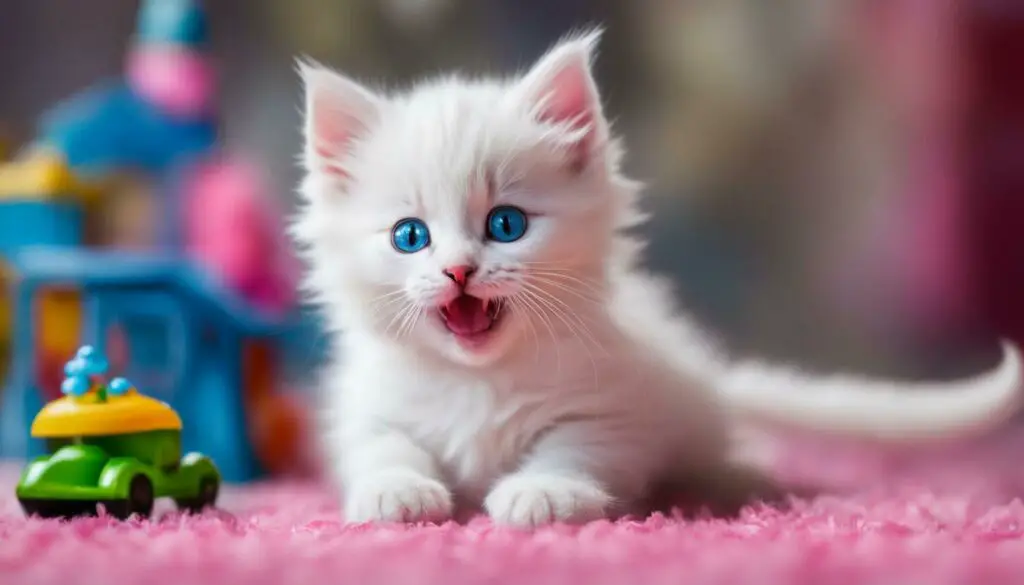
Common Health Issues That Cause Excessive Meowing
Excessive meowing in kittens can sometimes be a symptom of underlying health problems, and it’s important to be aware of these potential issues. Pain, urinary issues, kidney disease, hyperthyroidism, cognitive dysfunction, deafness or loss of hearing or sight are among the common health issues that can cause excessive meowing in cats.
Pain can be a major reason for increased vocalization in kittens. Whether it’s due to an injury, inflammation, or an underlying condition, kittens may meow excessively to express their discomfort. Urinary issues, such as urinary tract infections or bladder stones, can also lead to increased meowing as kittens may experience pain or discomfort while urinating.
Kidney disease and hyperthyroidism are two common health problems in cats that can cause excessive meowing. These conditions affect the overall health of the cat and can result in increased vocalization. Cognitive dysfunction, similar to dementia in humans, can also contribute to excessive meowing in older cats.
| Health Issue | Common Symptoms |
|---|---|
| Pain | Restlessness, decreased appetite, aggression |
| Urinary issues | Frequent trips to the litter box, straining to urinate, blood in urine |
| Kidney disease | Increased thirst, weight loss, vomiting |
| Hyperthyroidism | Weight loss, increased appetite, hyperactivity |
| Cognitive dysfunction | Confusion, aimless wandering, changes in sleep patterns |
Deafness or loss of hearing or sight can also lead to excessive meowing in kittens. Cats who can’t hear or see properly may meow excessively as a way to navigate their environment or seek attention.
If you notice your kitten meowing excessively, pay attention to any accompanying symptoms or changes in behavior. Poor appetite, weight loss, vomiting, frequent thirst, or changes in litter box habits may indicate an underlying health issue. It’s crucial to consult a veterinarian for a proper diagnosis and appropriate treatment.
Hunger, Boredom, and Stress: The Behavioral Factors
Just like humans, kittens can become vocal when they’re hungry, bored, or stressed. Let’s explore how these behavioral factors can impact their meowing habits.
Hunger: Kittens have small stomachs and high energy levels, so they may meow excessively when they’re hungry. To address this, ensure that your kitten is being fed a balanced diet with the appropriate portions and feeding schedule recommended by your veterinarian. If your kitten continues to meow excessively despite being fed on time, consult your vet to rule out any underlying health issues.
Boredom: Kittens have a natural curiosity and need mental and physical stimulation. If they’re not provided with enough playtime and environmental enrichment, they may resort to excessive meowing to get your attention. Make sure to provide interactive toys, scratching posts, and designated play areas to keep them entertained. Regular play sessions and rotation of toys can also help prevent boredom-related meowing.
Stress: Kittens can experience stress when there are changes in their environment or routine. This can include moving to a new home, the addition of new pets, or changes in their social dynamics. Stress-related meowing can also be triggered by loud noises, separation anxiety, or unfamiliar situations. Providing a calm and secure environment, establishing a routine, and using pheromone diffusers or calming aids can help alleviate their stress and reduce excessive meowing.
| Behavioral Factors | Impact on Meowing Habits |
|---|---|
| Hunger | Excessive meowing due to hunger can be resolved by ensuring proper feeding and portion control. |
| Boredom | Insufficient mental and physical stimulation can lead to increased meowing. Providing toys and playtime can help address this. |
| Stress | Changes in the environment or routine can cause stress-related meowing. Creating a calm environment and using calming aids can help alleviate stress. |
Understanding and addressing the behavioral factors that contribute to excessive meowing is essential for the well-being of your kitten. By ensuring they are well-fed, mentally stimulated, and in a stress-free environment, you can help minimize excessive meowing and create a harmonious bond with your furry friend.
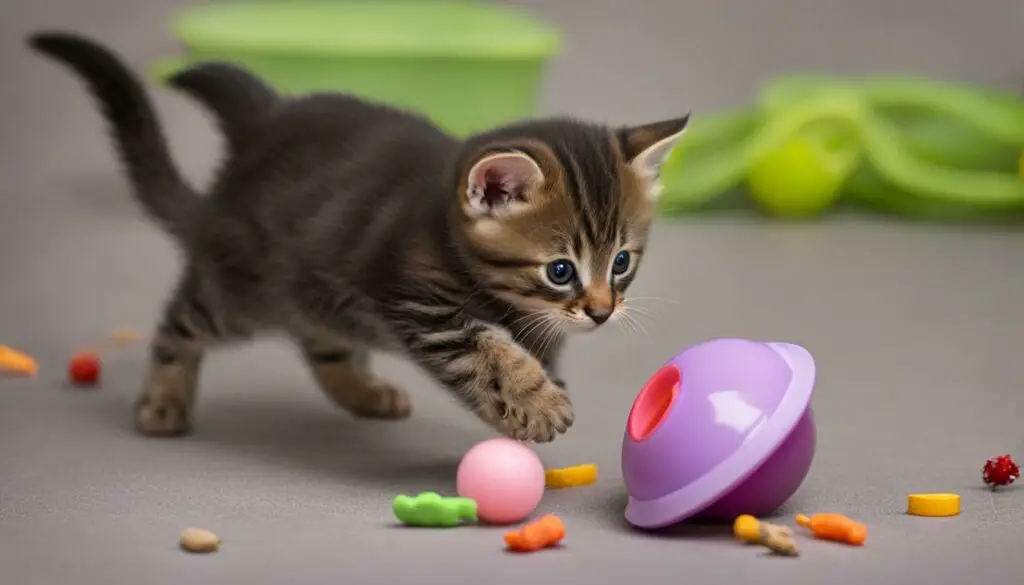
Breed Traits and Mating Habits
Certain cat breeds have distinct traits and behaviors, including specific meowing patterns related to their breeding or mating habits. Understanding these traits can help owners better comprehend their kitten’s vocalizations and provide appropriate care.
For example, Siamese cats are known for their loud and demanding meows, often referred to as “talking cats.” This breed is highly vocal, using different sounds to convey their needs and desires. Maine Coons, on the other hand, have softer and more chirp-like meows, which they often use to communicate with their owners or other cats. Persian cats, known for their luxurious coats, tend to have softer and quieter meows compared to other breeds.
Mating habits also play a role in a cat’s meowing behavior. Male cats, especially those that haven’t been neutered, may yowl loudly to attract a mate. This behavior is more common during the breeding season. Female cats, on the other hand, may meow to signal their availability to potential mates. These mating-related meows are often more intense and frequent during heat cycles.
Understanding these breed-specific traits and mating habits can help cat owners recognize and appreciate their kitten’s unique vocalizations. It is important to remember that excessive meowing in any breed should still be addressed to ensure the well-being of the cat.

| Breed | Traits | Mating Habits |
|---|---|---|
| Siamese | Loud, demanding meows | Vocal, attracts mates with loud calls |
| Maine Coon | Soft, chirp-like meows | Uses meows to communicate with owners and other cats |
| Persian | Soft, quiet meows | Less vocal, meows are softer compared to other breeds |
Understanding Nighttime Meowing
Many kitten owners find themselves losing sleep as their furry companions meow relentlessly during the night. Let’s uncover the reasons behind this nocturnal chorus.
Nocturnal meowing in kittens can be attributed to various factors. One common reason is boredom. Kittens are naturally curious and energetic, but they may not have enough stimulation during the day, leading them to seek attention and entertainment at night. Providing interactive toys and engaging in play sessions before bedtime can help tire them out and reduce nighttime meowing.
Another possible cause of nighttime meowing is hunger. Kittens have smaller stomachs, and their energy requirements are higher compared to adult cats. They may need an extra meal or a snack before bedtime to keep them satisfied throughout the night. However, it’s important to establish a routine and avoid feeding them excessively, as it can lead to weight gain and other health issues.
Quote: “Cats are nocturnal animals by nature, and their communication during the night is their way of expressing their needs or seeking attention,” says Dr. Emily Williams, a feline behavior specialist.
It’s also worth considering that meowing at night can be a sign of underlying health issues. Conditions such as hypertension, overactive thyroid, or cognitive dysfunction may contribute to excessive meowing during the night. If your kitten’s nighttime meowing is accompanied by other signs like poor appetite or weight loss, it’s crucial to consult a veterinarian for further evaluation and appropriate treatment.

In summary, while nighttime meowing in kittens can be frustrating for owners, it’s essential to approach it with patience and understanding. By addressing their need for stimulation and ensuring their basic needs are met, such as regular feeding and a comfortable sleeping environment, you can help minimize nighttime meowing and promote a restful sleep for both you and your furry friend.
| Reasons for Nighttime Meowing | Solutions |
|---|---|
| Boredom | Provide interactive toys and play sessions before bedtime. |
| Hunger | Consider an extra meal or a small snack before bedtime. |
| Underlying health issues | Consult a veterinarian if accompanied by other concerning signs. |
Attention-Seeking Meowing: How to Curb the Calls
If your kitten seems to constantly meow for attention, there are ways you can address this behavior without reinforcing it. It’s important to understand that cats are intelligent creatures who quickly learn which behaviors get their desired response. By using positive reinforcement and redirecting their focus, you can help your kitten develop healthier communication patterns.
One effective strategy is to establish a routine for playtime and interaction. Engage with your kitten in interactive play sessions, using toys and activities that stimulate their natural instincts. This will not only provide them with the attention they crave but also tire them out, reducing their urge to meow for attention.
Another helpful technique is to practice ignoring the meowing. When your kitten starts meowing excessively, withhold attention or eye contact. Only respond and provide affection when they are calm and quiet. This teaches them that meowing doesn’t get them what they want, and they will soon learn to seek attention in more appropriate ways.
| Playtime Tips: | Attention-Seeking Techniques: |
|---|---|
|
|
Remember, consistency is key when addressing attention-seeking meowing. Stick to the routine and avoid giving in to their demands. With time, your kitten will learn that their meowing doesn’t yield the desired response and will find alternative ways to communicate with you.
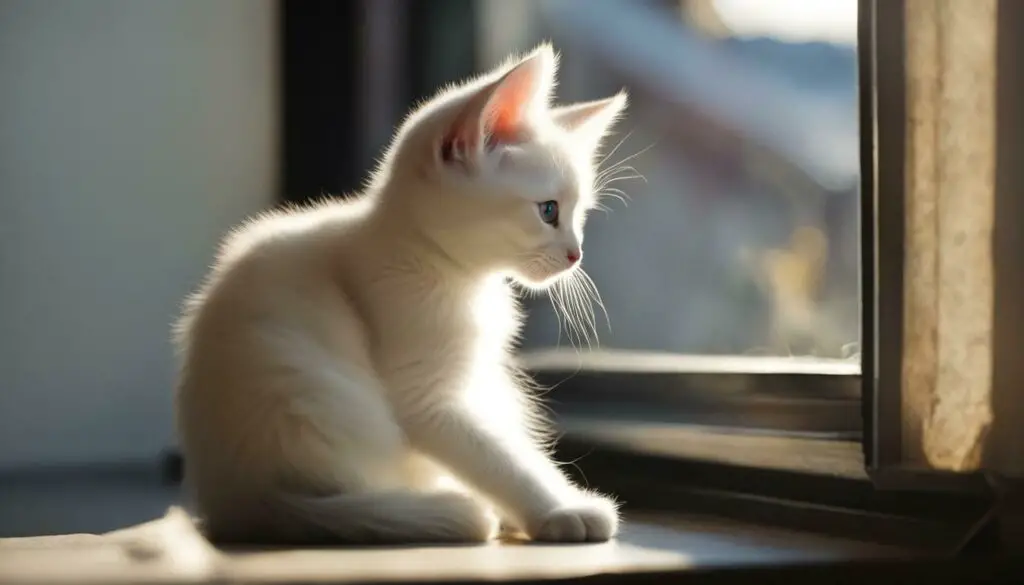
Summary
If your kitten won’t stop meowing for attention, it’s important to establish routines for playtime and interaction and to use positive reinforcement techniques. Engaging in interactive play sessions, ignoring excessive meowing, and redirecting their behavior towards appropriate activities will help your kitten develop healthier communication patterns. Remember to be consistent and avoid reinforcing the meowing behavior. By providing the right attention and guiding them towards alternative ways of communication, you’ll be able to curb their excessive meowing and foster a stronger bond with your furry friend.
The Importance of Positive Reinforcement
Using positive reinforcement techniques is crucial in helping your kitten feel safe and secure, without resorting to punishment-based methods. Kittens, like all animals, respond much better to rewards and encouragement than they do to fear or punishment. Positive reinforcement involves rewarding desired behaviors with treats, praise, or play, and can be highly effective in shaping your kitten’s behavior.
One of the key advantages of positive reinforcement is that it helps build a strong bond of trust between you and your kitten. By rewarding good behavior, you create a positive association and encourage your kitten to repeat those behaviors. This not only helps in addressing excessive meowing but also promotes other desirable behaviors, such as using the litter box, scratching appropriate surfaces, and playing gently.
When addressing excessive meowing, it’s important to reward moments of silence rather than scolding or reprimanding your kitten for meowing. For example, if your kitten meows excessively for attention, wait for a brief pause before petting or playing with them. This reinforces the idea that quiet behavior is more likely to result in the desired attention.
Remember, kittens are learning about the world around them and use meowing as a form of communication. Punishing or scolding them for meowing can create fear and damage the lines of communication between you and your kitten. Instead, focus on positive reinforcement, patience, and understanding. By providing your kitten with a safe and nurturing environment, addressing their needs, and using positive reinforcement techniques, you can help reduce excessive meowing and build a strong, loving bond with your furry friend.
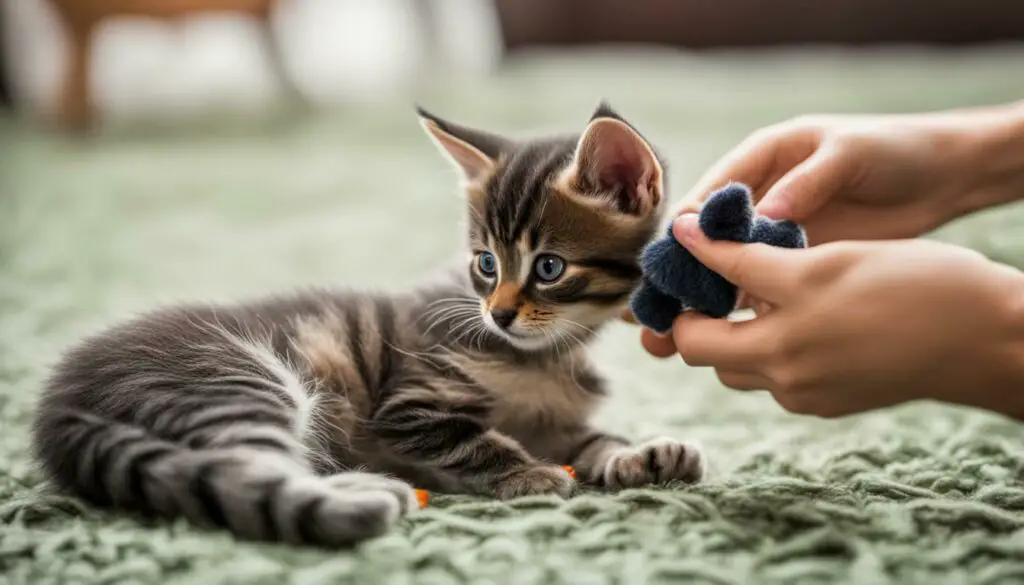
Seeking Veterinary Advice
While most cases of excessive meowing in kittens can be addressed at home, certain situations may require professional intervention. If you notice a change in your kitten’s meow tone or frequency, or if there are accompanying signs such as poor appetite or weight loss, it is highly recommended to consult a veterinarian. The expertise of a veterinarian is invaluable in identifying any underlying health issues that may be causing your kitten’s excessive meowing.
When you visit the veterinarian, they will conduct a thorough examination to determine the cause of your kitten’s excessive meowing. They may also request additional diagnostic tests such as blood work or imaging to get a comprehensive understanding of your kitten’s health. Remember to provide the veterinarian with as much information as possible, including any recent changes in your kitten’s behavior, diet, or environment.
Based on their findings, the veterinarian will develop a customized treatment plan for your kitten. This may include medication, dietary changes, environmental enrichment, or behavior modification techniques. Following the veterinarian’s advice and regular follow-up visits will help ensure that your kitten receives the necessary care and support.
Summary:
- Consult a veterinarian if you observe a change in your kitten’s meow tone or frequency, or if there are accompanying signs such as poor appetite or weight loss.
- The veterinarian will conduct a thorough examination and may request additional diagnostic tests to identify the underlying cause of your kitten’s excessive meowing.
- Based on their findings, the veterinarian will develop a customized treatment plan for your kitten, which may include medication, dietary changes, environmental enrichment, or behavior modification techniques.
- Regular follow-up visits are important to monitor your kitten’s progress and ensure they receive the necessary care and support.
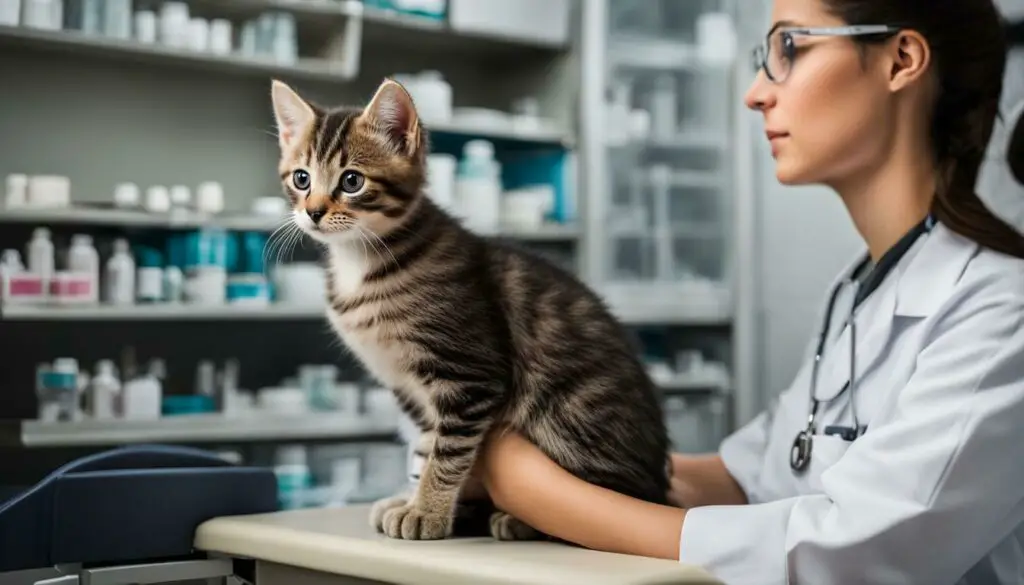
Conclusion
Understanding why your kitten is meowing excessively is the first step towards helping them find comfort and contentment in their environment. Excessive meowing in kittens can be a sign of distress or illness, and it is important to address their calls and provide appropriate care.
There are various reasons why kittens meow excessively, including pain, urinary issues, kidney disease, hyperthyroidism, cognitive dysfunction, deafness or loss of hearing or sight, hunger, boredom, stress, breed traits, mating habits, and the need for attention or play. It’s crucial to identify the underlying cause of their meowing to effectively address their needs.
Some kittens may meow excessively at night due to boredom or the need for something. Health issues such as hypertension, overactive thyroid, or cognitive dysfunction may also contribute to excessive meowing during nighttime. Understanding these factors can help you find ways to mitigate the behavior and create a more peaceful sleep environment.
To address excessive meowing in kittens, it’s important to ensure their basic needs are met, provide mental and physical stimulation, and avoid rewarding attention-seeking meowing. Patience is key, and waiting for moments of silence before providing attention can help discourage excessive meowing. It’s crucial to refrain from scolding or hitting your kitten as this can cause fear and damage the lines of communication between you and your furry friend.
If you notice a change in your kitten’s meow tone or frequency, or if their excessive meowing is accompanied by signs like poor appetite or weight loss, it is recommended to consult a veterinarian. Seeking professional advice can help identify any underlying health issues and ensure your kitten receives the appropriate care and treatment.
FAQ
Why is my kitten meowing so much?
Kittens meow a lot because they are still developing their communication skills. However, excessive meowing in kittens can be a sign of distress or illness.
What are the common reasons for excessive meowing in cats?
Common reasons for excessive meowing in cats include pain, urinary issues, kidney disease, hyperthyroidism, cognitive dysfunction, deafness or loss of hearing or sight, hunger, boredom, stress, breed traits, mating habits, and the need for attention or play.
Why does my cat meow at night?
Cats may meow at night out of boredom or because they want something. Health issues such as hypertension, overactive thyroid, or cognitive dysfunction may also contribute to excessive meowing at night.
Why does my male cat yowl?
Male cats may yowl when they are looking for a mate.
Why does my female cat yowl?
Female cats may yowl to signal their availability.
How can I address my cat’s excessive meowing?
To address a cat’s excessive meowing, it is important to identify the cause and ensure their basic needs are met. Avoid rewarding attention-seeking meowing, be patient, and wait for moments of silence before providing attention. It is crucial not to scold or hit a cat for meowing, as this can cause fear and damage the lines of communication.
When should I consult a veterinarian?
In cases of a change in meow tone or frequency or accompanying signs like poor appetite or weight loss, it is recommended to consult a veterinarian.

